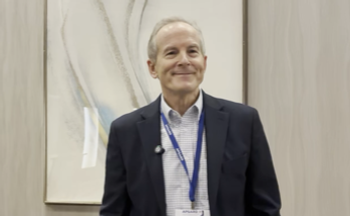
How Can You Learn and Benefit From the Field of Emergency Psychiatry?
Tony Thrasher, DO, DFAPA, shared his thoughts on emergency psychiatry: an honor and a great stressor.
CONFERENCE REPORTER
“In my time working in the world of emergency psychiatry, I have been very, very impressed by how it has evolved and expanded to really help with a great deal of patient care, outpatient, inpatient, and every single thing that kind of happens in between,” shared Tony Thrasher, DO, DFAPA, at the
“One of my favorite things about emergency psychiatry, is we sit at the intersection with our colleagues and emergency medicine. And there's a lot of crossover and synergy between those particular scopes, including that of our more community colleagues in emergency medical services,” said Thrasher, who is immediate past president of the American Association for Emergency Psychiatry, and medical director of crisis services of Milwaukee County.
In terms of ethics, Thrasher reviewed what he considered to be the “Big 4”: beneficence, autonomy, nonmaleficence, and justice. “When you're working in the world of emergency psychiatry, these do not always run in parallel to each other in fact, they tend to bump into each other a lot,” said Thrasher.
Nonmaleficence and justice in particular have the potential to cause conflicts. Thrasher noted that this pair is one that he finds most clinicians in the world of emergency psychiatry struggle with the most, as the unfortunate reality is that it is sometimes easier for patients to access certain services when they are hospitalized involuntarily rather than voluntarily. When dealing with issues of nonmaleficence and justice, Thrasher encouraged clinicians to ask themselves: How are patients placed in the involuntary/emergency pathway? Are we using the involuntary/emergency pathway to ensure access and mitigate risk? How does this affect parity?
As to skill sets, Thrasher listed engagement, approach, de-escalation, and motivation as valuable skills for the emergency clinician to possess. Engagement, while useful in all fields, requires emergency clinicians to respect patients and find a fluid approach to meeting needs. As to approach, clinicians should be nonjudgmental and use trauma-informed techniques rooted in psychological first aid. Practicing de-escalation before needing it is also essential. Lastly, using motivation, or finding the immediate need of the patient in order to determine acute and chronic approaches to stress, is a valuable skillset for clinicians.
“If you see a skill set here in which you or your team feels they could use more instruction, bring in your emergency psychiatry colleagues. They are often very skilled at education and going over some of these concepts,” said Thrasher.
Do not miss any updates or overviews from the
Newsletter
Receive trusted psychiatric news, expert analysis, and clinical insights — subscribe today to support your practice and your patients.







